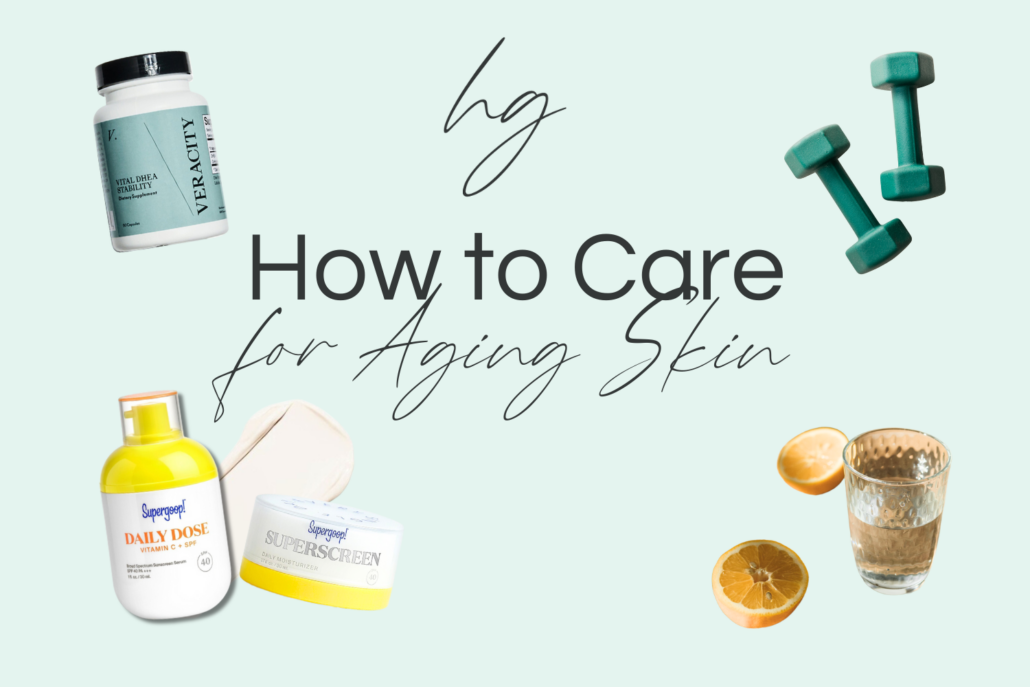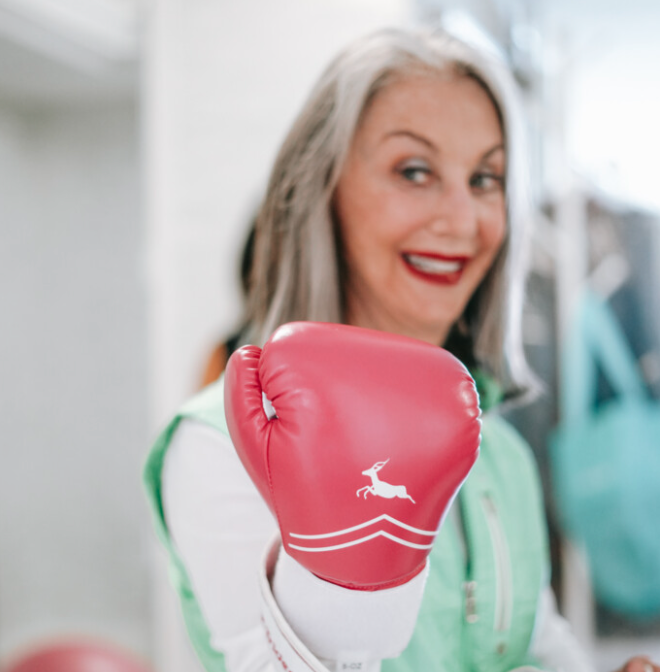Today’s post on caring for aging skin was written by Cora Gold—a skincare and beauty writer, as well as the editor of women’s lifestyle magazine, Revivalist. She knows her stuff when it comes to caring for aging skin. Enjoy, darlings!

Caring for aging skin goes beyond facial moisturizers. Here’s what else to do.
*Affiliate Disclosure
Aging changes the skin. Dark spots and fine lines that weren’t there before are now more visible. These skin problems are inevitable — and nothing to be ashamed of — but they don’t mean you should stop caring for your skin when you reach your 50s or 60s. It’s important to consistently care for your skin as you age to help maintain its health and appearance.
Today I’ll share easy tips that anyone can incorporate into their routines, and most of them are practically free!
You may also enjoy my posts: What Is Menopausal Skin and How to Care for It, and The Value of Remaining Body Positive Through Aging.
Introduction to Aging Skin
Aging skin is a natural part of life, and it’s something everyone experiences as the years go by. As we age, our skin’s protective barrier gradually weakens, which can lead to changes in skin texture, tone, and overall appearance. You might notice your skin feels drier, fine lines and wrinkles become more pronounced, and your complexion may lose some of its youthful glow. These changes are all part of the natural aging process, but that doesn’t mean you can’t take steps to support your skin health and maintain a radiant look.
Understanding how aging affects your skin is the first step toward developing an effective anti-aging skincare routine. With the right anti-aging products and targeted treatments, you can improve skin tone, minimize the appearance of fine lines, and enjoy younger-looking skin at any age. Embracing the changes while caring for your skin helps you feel confident and beautiful, no matter your stage in life.
Understanding Aging Concerns
As we get older, it’s common to notice new aging concerns like fine lines, wrinkles, and uneven skin tone. These changes are often caused by a buildup of dead skin cells, a decrease in natural oils, and a slowdown in collagen production. Dry skin and premature aging can also become more noticeable, especially if your skincare routine isn’t tailored to your skin’s evolving needs.
The good news is that many of these concerns can be addressed with the right anti-aging skincare products and a consistent routine. Look for specially formulated products that contain powerful anti-aging ingredients such as vitamin C, retinol, and hyaluronic acid. These ingredients work together to improve skin texture, boost collagen production, and even out skin tone, helping to reduce the appearance of fine lines and wrinkles. By choosing gentle, effective products and sticking to a regular routine, you can keep your skin looking healthy, smooth, and vibrant.
Common Aging Skin Issues
As the years pass, you may notice common aging skin issues like age spots, dark spots, uneven pigmentation, and persistent dry skin. These visible signs of aging are a natural part of the process, but they can be managed with a simple, consistent skincare routine. Using anti-aging products with moisturizing ingredients and applying a broad-spectrum sunscreen every day are essential steps to protect your skin and prevent further damage.
For those looking to address more stubborn concerns, professional treatments such as laser treatments and chemical peels can help reduce the appearance of dark spots and uneven pigmentation. However, it’s important to consult with a dermatologist or skincare professional before starting any advanced treatments to ensure they’re right for your skin type and aging concerns. With the right approach, you can keep your skin looking healthy and radiant at any age.
8 Ways To Care for Aging Skin
Looking after your skin is essential when you’re older because it’s thinner and more sensitive. The following tips are key steps to help you build an effective anti aging routine that addresses the unique needs of mature skin. Here are some tips for glowy and fabulous skin in your 50s and beyond.
1. Care for Your Aging Skin By Hydrating With Water
Proper hydration helps enhance the health and youthfulness of your skin. You look radiant when your skin is elastic from drinking water. Replace alcohol and other unhealthy beverages with water. It’s the most straightforward and cheapest way to improve overall skin health without medical treatments.
Many older adults forget to drink water, so find a way to integrate or stack drinking water into your routine. For instance, drink at least a glass after a meal. When you take your meds, drink a full glass. When you go to the bathroom, replenish with another glass of water — you get the gist. Drink water as often as possible until you meet the required daily fluid intake.
2. Eat Your Way to a Glowing Skin

Preparing healthy food for yourself has the added benefit of being great for your skin!
Fabulous skin is partly a result of a healthy diet. As skin ages, it produces less oil, which can lead to dryness; a diet rich in healthy fats can help compensate for this change and support skin hydration. Like foods for the brain, good fats and vitamins make your skin look supple and glowing.
Salmon and mackerel are loaded with omega-3 fatty acids that can reduce inflammation that causes acne and redness. They also contain vitamin E and antioxidant properties that protect you from UV-induced signs of skin inflammation, such as swelling and edema. Other foods rich in skin-health benefits are avocados, sunflower seeds, broccoli, sweet potatoes, walnuts, and tomatoes.
3. Combo a Moisturizer and Sunscreen Daily to Protect Aging Skin
Water hydrates your skin from the inside out and moisturizers do it from the outside. Choose a face moisturizer for mature skin, as they contain formulas that solve common skin problems of older people, like dry and dark spots. Choose a sunscreen with at least SPF 30 and apply anytime you go outside, especially from noon to 4 p.m.
Do the same with the rest of your body. Apply moisturizer, first on your arms and legs and finish it with a layer of sunscreen. This combination provides effective protection against sun damage and premature aging, helping to shield your skin from harmful UV rays.
4. Quit Smoking for Improved Skin Health (and Overall Health!)
Smoking can irreparably damage your skin. One study found cigarette smokers have lower skin hydration than non-smokers.
Tobacco products have toxins that break down collagen and elastin the skin needs to stay supple. Smoking can lead to various dermatological concerns, including premature aging, delayed wound healing, severe psoriasis symptoms, acne and skin cancer. Give up smoking or reduce your daily cigarettes if you want to protect your skin.
5. Achieve Firm Skin With Exercise

The best type of exercise to care for aging skin? The one you’ll actually do. Honey Good loves to box.
It may be challenging to hit the gym in your 50s and beyond, but you might get inspired if you know that exercise can make your skin vibrant and glowy. As the blood circulates, it delivers nutrients to various body organs, including the skin.
Exercise increases the oxygen-rich blood and nutrients carried to your skin. As skin begins to lose elasticity and firmness with age, regular exercise can help support a more youthful appearance. That’s why your skin looks radiant, firm and plump after working out. Indirectly, physical activities also lower blood sugar levels which could damage the collagen necessary for healthy skin.
BOXING FOR WOMEN OVER THE AGE OF 50 – AND WHY YOU SHOULD START!
6. Use Gentle Skin Care Products
The body makes less collagen as you age, leading to wrinkles and fragile skin. Use gentle skincare products to hydrate mature skin without washing away its natural oils. Good options are plant-oil- and glycerin-based body soaps, and creamy face cleansers with hyaluronic acid. It’s best to choose a gentle face cleanser that is mild and non-irritating to avoid unnecessary irritation. Many face and body washes on the market contain harsh chemicals that dry the skin, so read the labels before buying a product or ask a dermatologist for recommendations. Using gentle products helps maintain and protect the skin barrier, which is essential for healthy, resilient skin.
Use the products to wash your face two times a day — in the morning and the evening — using warm water. Exfoliate weekly to remove excess oils and dirt that dull the skin. Lather a gentle body wash and make your bath time short. The longer you stay in the shower, the more dry your skin becomes.
7. Take Supplements to Support Healthy Skin
Aging also affects the appetite and taste palate. Your favorite foods may be less delectable, so you’d naturally eat less and be selective of what to put into your mouth. This change leads to vitamin or nutrient deficiencies in many older people. If you need more nutrition, your doctor may recommend supplements to promote skin health.
Fish oils are one example if you consume less seafood and don’t get omega-3 fatty acids. They can replenish the lost natural oil on the skin, and make it look healthier and hydrated. Like this supplement, Vital Dhea Stability by Veracity boosts the body’s own DHEA levels (a type of omega-3), the key to reducing signs of hormonal aging such as loss of skin firmness and wrinkles.
Consult your doctor before taking any supplements.
8. Find Ways to Decompress to Aid Aging Skin
When you’re stressed, the body functions irregularly. The glands produce more sebum that causes acne or worsens breakouts. If you have eczema or psoriasis, stress can lead to a flare-up of symptoms.
Adopt methods to de-stress and regulate your body’s internal processes. Some people love meditating to stop cycles of overthinking leading to stress. Others enjoy catching up with friends and family. Find a few things that make you feel calm and happy — your skin and health benefit from doing these things.
Anti Aging Ingredients to Look For
When building your anti-aging skincare routine, choosing products with proven, effective ingredients is key to maintaining skin health and a youthful glow. Vitamin C serum is a favorite for brightening skin tone and protecting against environmental damage, while retinol serum is renowned for its ability to reduce fine lines and wrinkles and encourage cell turnover. Hyaluronic acid is another powerhouse, drawing moisture into the skin to keep it plump and hydrated.
Look for anti-aging skincare products that are gentle and fragrance free, especially if your skin is sensitive. Cleansers with lactic acid or ascorbic acid can help exfoliate and brighten without irritation. By incorporating these anti-aging ingredients into your daily routine, you’ll help improve skin tone, smooth fine lines, and support your skin’s natural resilience—so you can enjoy healthy, beautiful skin at any age.
Additional Resources for Aging Skin Care
If you’re looking for more guidance on caring for aging skin, consider consulting with a dermatologist or skincare professional. They can help you develop a personalized anti-aging skincare routine that’s tailored to your unique skin type and concerns. There are also many reputable online resources, including skincare blogs and expert websites, that offer valuable information on anti-aging ingredients, products, and treatments.
No matter where you are in your skincare journey, remember to prioritize sun protection, choose gentle, fragrance-free products, and maintain a consistent routine. With the right care and a little expert advice, you can achieve healthy, younger-looking skin and feel confident in your natural beauty every day.
Glow From Within in Your 50s and Beyond
You can do many things to protect your skin as it ages. Adopting a simple routine that includes cleansing, moisturizing, and sun protection can help maintain healthy skin. Lifestyle is a significant part of a healthy body and skin. A consistent skin care routine is essential for achieving long-term results and keeping your skin looking its best. These lifestyle tips are also important components of anti aging skin care, helping to reduce visible signs of aging and support youthful skin.
Go for a run, join a yoga class or hit the gym for at least 30 minutes daily. Drink plenty of water to rehydrate your skin from the inside. Be wiser about your food choices and add more greens and fruits to your meal plan. Quit smoking, adopt a relaxation method and buy gentle skin care products. Get assessed by your doctor to determine if you have vitamin deficiency so they can prescribe a supplement.
*This is not intended to be a substitute for personalized medical advice. Please speak with your doctor before making changes to your diet (including supplements) or exercise routines.
I’ve shared my well-researched tips, do you have any for me? Please share in the comments!
 Author bio: Cora Gold is a skincare and beauty writer, as well as the editor at women’s lifestyle magazine, Revivalist. Connect with Cora on LinkedIn, Twitter, and Pinterest.
Author bio: Cora Gold is a skincare and beauty writer, as well as the editor at women’s lifestyle magazine, Revivalist. Connect with Cora on LinkedIn, Twitter, and Pinterest.
If you enjoyed this story about caring for aging skin, please subscribe to my email list. When I post a new story, you will receive it in your inbox.

*Honey Good may receive a small commission for items purchased through links on this page. This helps with the cost of running the site and is at no additional cost to you.
+ show Comments
- Hide Comments
add a comment